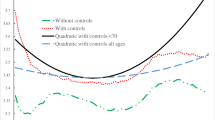Abstract
This study investigates the prevalence and extent of altruism by examining the relationship between parents’ and their adult children’s subjective well-being in a data set extracted from the German Socio-Economic Panel. To segregate the share of parents with altruistic preferences from those who are selfish, we estimate a finite mixture regression model. We control for various sources of potential bias by taking advantage of the data’s panel structure. To validate our modeling approach, we show that predicted altruists indeed make higher average transfer payments.
Similar content being viewed by others
References
Andreoni J, Miller J (2002) Giving according to GARP: an experimental test of the rationality of altruism. Econometrica 70(2):737–753
Barro R (1974) Are government bonds net wealth? J Polit Econ 82(6):1095–1117
Becker G (1981) Altruism in the family and selfishness in the market place. Economica 48(189):1–15
Bertola G, Foellmi R, Zweimueller J (2006) Income distribution in macroeconomic models. Princeton University Press, Princeton
Boes S, Winkelmann R (2006) Ordered response models. Allg Stat Arch 90(1):165–180
Broyden C (1970) The convergence of a class of double-rank minimization algorithms. IMA J Appl Math 6(1):76–90
Celeux G, Chauveau D, Diebolt J (1996) Stochastic versions of the EM algorithm: an experimental study in the mixture case. J Stat Comput Simul 55(4):287–314
Clark A, Oswald A (1994) Unhappiness and unemployment. Econ J 104(424):648–659
Clark A, Etile F, Postel-Vinay F, Senik C, Van der Straeten K (2005) Heterogeneity in reported well-being: evidence from twelve European countries. Econ J 115(502):C118–C132
Clark A, Frijters P, Shields M (2006) Income and happiness: evidence, explanations and economic implications. PSE Working Paper 24, Paris
Dempster A, Laird N (1977) Maximum likelihood from incomplete data via the EM algorithm (with discussion). J R Stat Soc 39(1):1–38
Di Tella R, MacCulloch R (2006) Some uses of happiness data in economics. J Econ Perspect 20(1):25–46
Fehr E, Fischbacher U (2002) Why social preferences matter—the impact of non-selfish motives on competition, cooperation and incentives. Econ J 112(478):C1–C33
Fehr E, Schmidt K (2002) Theories of fairness and reciprocity—evidence and economic applications. In: Advances in economics and econometrics—8th world congress, economic society monographs. Cambridge University Press, Cambridge
Frey B, Stutzer A (2001) Happiness and economics: how the economy and institutions affect human well-being. Princeton University Press, Princeton
Frey B, Stutzer A (2002) What can economists learn from happiness research? J Econ Lit 40(2):402–435
Laferrere A, Wolff F (2006) Microeconomic models of family transfers. In: Kolm S, Ythier JM (ed) Handbook on the economics of giving, altruism and reciprocity, vol 2. North-Holland, Amsterdam
Layard R (2005) Happiness: lessons from a new science. Penguin, London
McKelvey R, Zavoina W (1975) A statistical model for the analysis of ordinal level dependent variables. J Math Soc 4:103–120
McLachlan G, Peel D (2000) Finite mixture models. Wiley series in probabilities and statistics. Wiley, New York
Mundlak Y (1978) On the pooling of time series and cross section data. Econometrica 46(1):69–85
Phelps C (2001) A clue to the paradox of happiness. J Econ Behav Organ 45(3):293–300
R Development Core Team (2005) R: a language and environment for statistical computing. R Foundation for Statistical Computing, Vienna. http://www.R-project.org
Render R, Walker H (1984) Mixture densities, maximum likelihood and the EM algorithm. SIAM Rev 26(2):195–239
Rivers D, Vuong Q (1988) Limited information estimators and exogeneity tests for simultaneous probit models. J Econom 39(3):347–366
Schwarze J, Winkelmann R (2005) What can happiness research tell us about altruism? Evidence from the German Socio-Economic Panel. SOI Working Paper 0503, Zurich
Terza J (1987) Estimating linear models with ordinal qualitative regressors. J Econom 34(3):275–291
Wagner G, Burkhauser R, Behringer F (1993) The english language public use file of the German socio-economic panel. J Hum Resour 28(2):429–433
Winkelmann R (2005) Subjective well-being and the family: results from an ordered probit model with multiple random effects. Empir Econ 30(3):749–761
Author information
Authors and Affiliations
Corresponding author
Additional information
Responsible editor: Deborah Cobb-Clark
Rights and permissions
About this article
Cite this article
Bruhin, A., Winkelmann, R. Happiness functions with preference interdependence and heterogeneity: the case of altruism within the family. J Popul Econ 22, 1063–1080 (2009). https://doi.org/10.1007/s00148-008-0198-3
Received:
Accepted:
Published:
Issue Date:
DOI: https://doi.org/10.1007/s00148-008-0198-3




